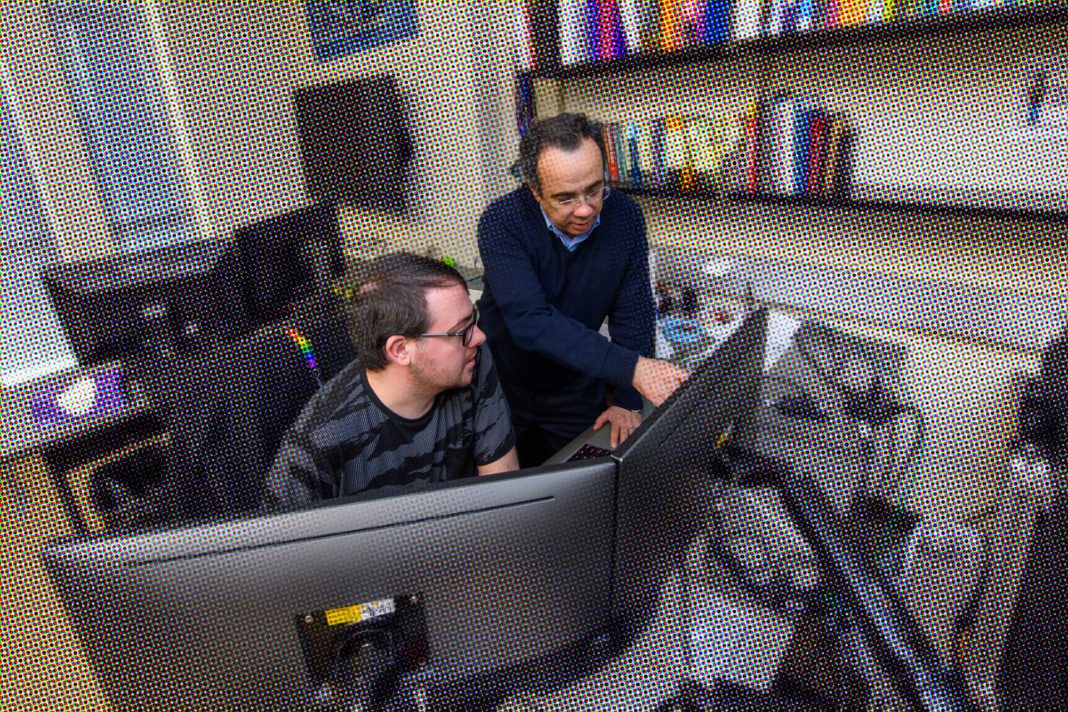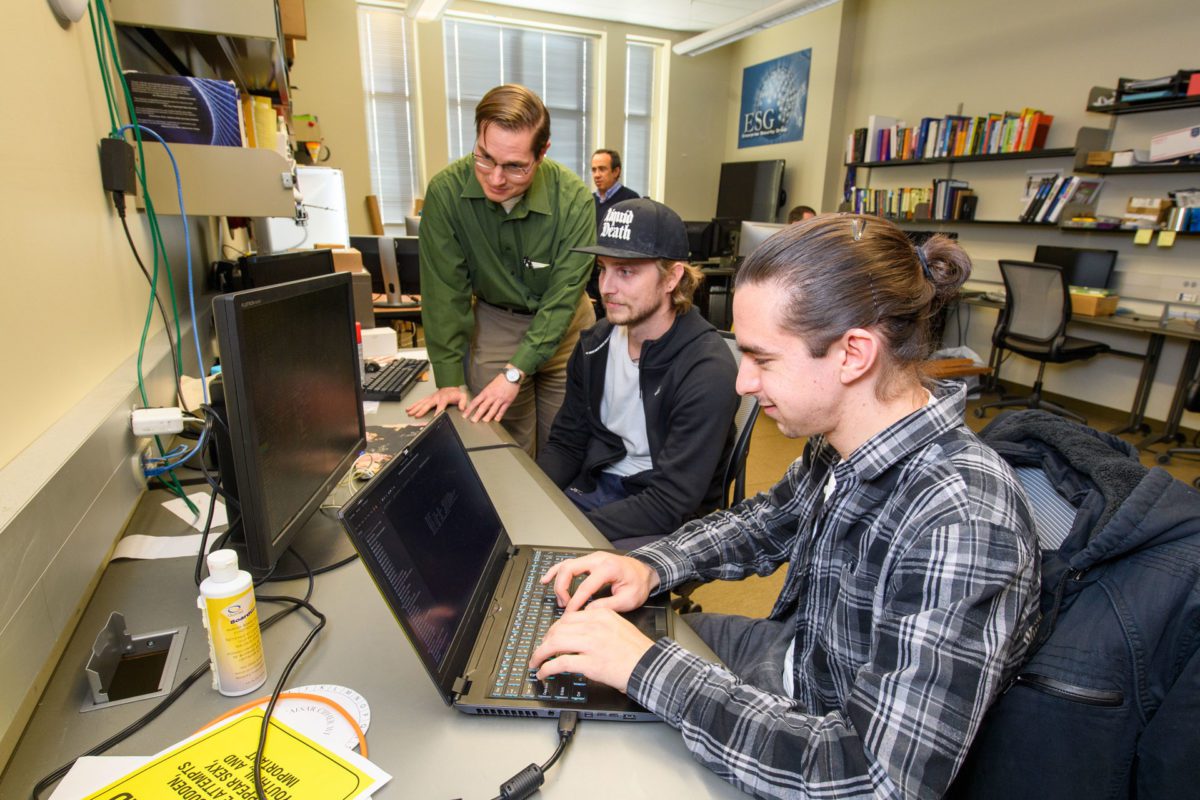Getting a Foot in the Door
It’s nothing to be ashamed of, but many people don’t understand the difference between the disciplines of computer science and computer information systems, says Sal Aurigemma, the J. Bradley Oxley professor of computer information systems at the University of Tulsa.
As a result, Aurigemma says, some students arrive at TU intending to major in one … only to find out they are better suited for the other.
Computer science is housed out of engineering, and CIS is in the business school, he says.
“Computer scientists are the folks who create the next-generation technology and tools – something we will do down the road,” he says. “They are very much focused on technical solutions, and they are very smart people.”
In CIS, he says, “we solve today’s problems with today’s technology, and work with our computer science counterparts to give them what they need to build the best product to solve the problems we have.”
CIS students are more business-focused, more honed on the interface between technology and the user. They supplement their technical training with classes in management, accounting and finance. Computer science focuses more on the hard sciences, says Aurigemma.
Either way, there’s plenty of work for everyone, says Eric Kehmeier, CEO of the Broken Arrow-based Integrated Business Technologies.
“The industry is growing, and it’s only going to keep growing,” he says.
IBT functions as an outsourced internet technology department for small and medium-sized businesses that don’t have such a department on-site.
“Most of my employees have a bachelor’s degree,” he says.
Kehmeier says excellent training is available at TU, the University of Oklahoma, Oklahoma State University and Oklahoma’s vocational-technical schools, to name a few.
“The more specialized you are, the higher the pay,” he says. “The hottest field is going to be in cybersecurity. We have more jobs in the industry than we have people to fill.”
Positions in the Sector
Aurigemma sometimes catches himself boasting about his TU program and its students – rightfully so.
“Our employment rate is close to, or it is, 100 percent,” he says. “The job prospects are fantastic.”
TU trains candidates in the information technology industry with bachelor’s degrees in computer science, computer information systems and cybersecurity, as well as a master’s degree in cybersecurity and a Ph.D. in cyber studies.
“We’ve been very active in computers and cybersecurity for a very long time,” he says. “And we have a long list of employers who come to our students, offering paid internships that pay an average of $20 an hour.”
People who are not in the field probably don’t realize how broad the internet technology industry really is, says Aurigemma. Specialties include software development, programming, IT management, web development, computer systems analysis and cybersecurity.
“The workforce needs so many IT professionals right now,” he says. “In such a short period of time, technology has become integral to everything in our lives.”
All specialties are needed, but cybersecurity is becoming increasingly crucial.
“We were one of the first universities in the nation to have a dedicated cybersecurity program,” says Aurigemma. “We have a bachelor’s that’s new. We have had a master’s for about five years. There are upwards of a million cybersecurity jobs in the United States alone.”
Cybersecurity requires a base knowledge of computer science and computer information systems, Aurigemma says, “but adds another layer of how things can be exploited and how they can be protected.”
Kehmeier says his internet technology managers are increasing their work with clients on security matters, including multi-factor authentication.
“We also do dark web monitoring, so if their credentials are for sale on the dark web, we can let them know about it and re-set it,” he says.
The Nitty Gritty
If you don’t like change, you are not going to like being in internet technology, says Kehmeier. But it’s the constantly evolving nature of the business, he says, that many longtime employees enjoy.
“A lot of people in this industry find it fun because it’s challenging and new,” says Kehmeier, who has worked in the field for more than 20 years. “Most IT jobs aren’t 8 to 5 jobs. There are times you have to work around the clock. But we find satisfaction in helping people do their jobs.”
The technology industry offers “a fit for any personality,” says Aurigemma. “Your satisfaction, part of it is knowing who you are and what you want to get out of a job. It’s almost a guarantee there is a job out there that meets your desired goals and what you want to get out of it. You just have to find it.”
The Importance of Soft Skills
Working in the information technology industry is about a lot more than staring at a computer screen. Even with a shortage of candidates, potential employers should not let their standards down when it comes to seeking people with the right skill sets, says Aurigemma.
“We need more people in the field, but technical skills are not enough,” he says. “They need soft skills too. They need to be able to communicate effectively and to have good moral values. Those things are just as important.”
Good customer service is crucial, says Kehmeier. He says tech employees must listen carefully to what their clients are telling them, especially the customers who are not well-versed in technical jargon. Information technology workers need to be problem-solvers, and people who know how to think analytically.
“A lot of it is detective work,” he says.
Buzzwords to Know
Artificial intelligence uses algorithms to look at info that currently exists, says Aurigemma. AI can very rapidly look at a lot of information and do things with it, such as classification. It can help predict where the next surge of COVID might be, for example, based on the types of things people are doing internet searches for.
The cloud is a pool of computing resources managed by large companies, so that organizations and individuals aren’t required to have their own servers, and it provides a level of service and security. The cloud is essential for modern businesses, Aurigemma says. It offloads the information into data sectors spread throughout the world.
The internet of things is something that cybersecurity people are concerned about, Aurigemma says.
“It’s all the other things being put on the internet that aren’t associated with people doing their jobs or enjoyment-browsing,” he says. “Even though I study cybersecurity and am very careful, I have things connected to the internet that are unmanaged. Most of these devices are dirt cheap, have very little security built into them and can be taken over to gain access. It’s coffee pots, televisions, everything on the internet that you never thought would be on the internet. Who thought refrigerators would be on there someday?”

























